Bastion
LQ: 9.15
Recommended Age: 10+
Skills Used: Planning, Working Memory, Mathematics, Reading
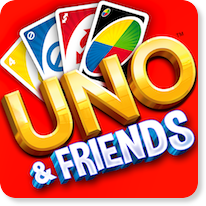
Uno & Friends brings the classic card game to the digital age, creating a fun multiplayer experience on a variety of mobile devices. Uno presents players with a unique deck of cards consisting of colored and numbered cards, wild cards, and strategic cards for manipulating gameplay. Players take turns playing cards, matching either the number or color of the previously played card. Using special cards can manipulate game play, such as the “draw” card that forces another player to draw additional cards or the “skip turn” card which forces a player to miss a turn. Combining strategy with a small amount of luck on the draw, the first player to utilize all of his or her cards wins. Uno & Friends rewards players with in-game currency that can be used to purchase additional power-ups to gain a greater number of points or an additional advantage during gameplay. This game contains no inappropriate content, is easy to learn and play, and is free to download. Uno & Friends is recommended to any player ages 4 and up.
Teachers: check out the classroom guide!
Adapting and adjusting to changing conditions and expectations.
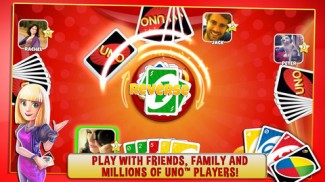 Playing Uno & Friends requires players to be able to adapt and alter strategies as gameplay advances and the circumstances of their match is altered. Cards are dealt randomly to players, making the course of the game unpredictable. Players must be able to account for a number of scenarios, playing the hand they have been dealt strategically so as to grant them the greatest chances of success. For example, saving special cards, like "skip turn" or "draw" cards for situations in which another player is close to victory are great ways to play "defensively" and give a player a greater chance of victory. Players must be able to shift their strategy when numbers or colors change, or when a special card is used against them. Players who are able to adjust and adapt fluidly will often experience greater success in Uno & Friends than those who do not.
Playing Uno & Friends requires players to be able to adapt and alter strategies as gameplay advances and the circumstances of their match is altered. Cards are dealt randomly to players, making the course of the game unpredictable. Players must be able to account for a number of scenarios, playing the hand they have been dealt strategically so as to grant them the greatest chances of success. For example, saving special cards, like "skip turn" or "draw" cards for situations in which another player is close to victory are great ways to play "defensively" and give a player a greater chance of victory. Players must be able to shift their strategy when numbers or colors change, or when a special card is used against them. Players who are able to adjust and adapt fluidly will often experience greater success in Uno & Friends than those who do not.
Developing a systematic approach for setting and achieving goals.
Though players are dealt random cards in each new game of Uno & Friends, some planning and strategizing can give players an advantage. Whether saving special cards for unique situations, or deciding which card to play in each round, players can create strategies for success based on the hand they have been dealt and based on the playing style of their opponents. For example, players who have a large number of cards in a particular color may plan to play their other colors first, saving special cards and matching cards for important situations. Though Uno & Friends contains a great amount of uncertainty and randomization, players who are able to develop strategies and plans for contingent situations will usually outperform opponents who do not.
Being efficient and aware of our use of time and effort.
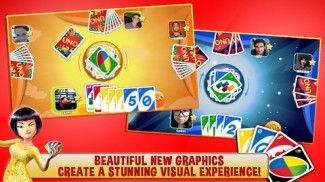 Playing Uno & Friends allows players to exercise the Time Management thinking skill in more than one way. Primarily, players will utilize time management when taking their turn. As the game progresses, each player is granted a predetermined increment of time in which to play or draw a card. Players can monitor their own turn time, or the time of an opponents turn via a shrinking colored line surrounding player icons that indicates how much time is remaining in each turn. Players must be able to make effective decisions in a limited amount of time, managing the clock and overcoming the pressure presented by a timer. Additionally, players will utilize the Time Management thinking skill when assessing strategies. For example, when a player notices another player close to victory, special cards can be used in order to delay an opponents turn and buy a player more time to diminish his or her own stack of cards.
Playing Uno & Friends allows players to exercise the Time Management thinking skill in more than one way. Primarily, players will utilize time management when taking their turn. As the game progresses, each player is granted a predetermined increment of time in which to play or draw a card. Players can monitor their own turn time, or the time of an opponents turn via a shrinking colored line surrounding player icons that indicates how much time is remaining in each turn. Players must be able to make effective decisions in a limited amount of time, managing the clock and overcoming the pressure presented by a timer. Additionally, players will utilize the Time Management thinking skill when assessing strategies. For example, when a player notices another player close to victory, special cards can be used in order to delay an opponents turn and buy a player more time to diminish his or her own stack of cards.
Use this Play Together guide to learn how you can help your child turn Uno & Friends play time into a positive learning and relationship-building experience. To learn more about why playing games with your children is so important, check out our Science of Play page.
Take a minute to talk with your child about how the Flexibility, Planning, and Time Management thinking skills work, and why they are important for success in school and at home.
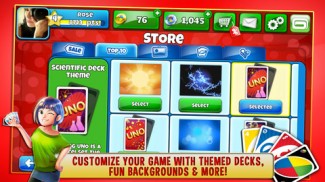 Uno & Friends lets players challenge friends and family members via an internet connection and downloading the app is free, making it easy to play along with your child or to challenge other players online.
Uno & Friends lets players challenge friends and family members via an internet connection and downloading the app is free, making it easy to play along with your child or to challenge other players online.
Gameplay Goals:
After you've won your first Uno & Friends match, take a moment to discuss the importance of the thinking skills at play with your child.
Our Make it Work activities are designed to transform your child’s gameplay to real-world improvements in thinking and academic skills. If you’re just getting started with LearningWorks for Kids, we suggest you try them all to find which are the best for you and your child.
Read over the pages for Flexibility, Planning, and Time Management. Then take some time to introduce these skills to your child.
Explain that:
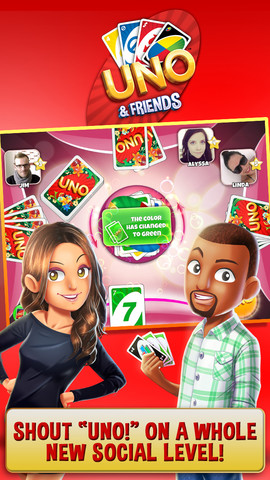 Get unstuck. Get stuck and then unstuck again in front of your kids. One of the best ways for children to learn about Flexibility skills is to see how other people resolve their own difficulties. Let your child observe you in problem solving, even if you are unsure of whether you will be able to overcome the difficulty. Model talking your way through a problem in which you are stuck. Children who are inflexible tend to believe that there is nothing that they can do to change a difficult situation. Even if you encounter a situation where there is no clear resolution, demonstrate some brainstorming skills about potential methods to solve the problem in front of you. Be sure to introduce perspective to help your child to realize that some problems simply go unsolved.
Get unstuck. Get stuck and then unstuck again in front of your kids. One of the best ways for children to learn about Flexibility skills is to see how other people resolve their own difficulties. Let your child observe you in problem solving, even if you are unsure of whether you will be able to overcome the difficulty. Model talking your way through a problem in which you are stuck. Children who are inflexible tend to believe that there is nothing that they can do to change a difficult situation. Even if you encounter a situation where there is no clear resolution, demonstrate some brainstorming skills about potential methods to solve the problem in front of you. Be sure to introduce perspective to help your child to realize that some problems simply go unsolved.
Create a master calendar of events to plan ahead. Model and use calendars to keep track of family events, and to prepare for all of the important events and deadlines that your child must attend to. Have him personalize individual events using pictures, graphics, stickers, or doodles. Your child may wish to take pictures to put on the calendar as reminders. Place the calendar in a public area, possibly with a duplicate calendar in his room. Encourage him to think about connecting each activity to how he decorated the particular date, helping him understand the details related to each marked date. Have your child post the calendar prominently in his room and give rewards or privileges for keeping it accurate and up-to-date.
Gimme a break. If your child has stagnated while performing a task, such as schoolwork or a chore, get him to move quickly doing something else. This could be a physical activity such as going for a quick bike ride, or something as simple as singing a song at a quickened pace. Getting him to move quickly in a fun (or even funny) activity may help him to become more aware of his pace in relation to other activities. Another strategy would be to take a 5-10 minute exercise break, which could include anything from doing a set of push-ups or situps, running up and down the stairs, or taking the dog out for a short walk. Initially, a parent will want to be in charge of when such breaks occur, but eventually we want the child to learn to identify when he needs to take a break himself, and furthermore, to be able to demonstrate that he is using the break responsibly by coming back to work better than before.
All membership plans come with full access to our entire suite of tools learning guides, and resources. Here are a few of the ones we think you’ll like the most: